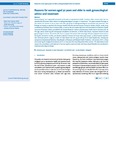Reasons for women aged 50 years and older to seek gynaecological advice and treatment
Krause, Laura
Dini, Lorena
Prütz, Franziska
Gynaecological care is generally perceived as focused on reproductive health. However, when women enter the nonreproductive
life phase, other reasons to seek gynaecological care gain in importance. This paper presents findings on
the reasons for women in the 50 years and older age group to seek gynaecological consultation and treatment. Our
findings are based on data from the German Health Interview and Examination Survey for Adults (DEGS1, 2008–2011),
conducted by the Robert Koch Institute (RKI), as well as the 2016 claims data from the Associations of Statutory Health
Insurance Physicians (KVen), provided by the Central Research Institute of Ambulatory Health Care in Germany (Zi). At
this age, cancer screening and menopausal complaints can become, as DEGS1 data shows, important reasons to seek
gynaecological services. Around 65.0% of 50- to 79-year-old women took advantage of breast palpation examinations
during the last twelve months, and 58.0% underwent cervical cell smear tests (pap smear). 47.2% of women had their
last menstrual period at age 50 or later. KV data shows that with 45.3% and 33.1% of cases respectively, menopausal
symptoms (International Statistical Classification of Diseases and Related Health Problems, 10th revision, ICD-10: N95)
and screening for malignant neoplasms (ICD 10: Z12) were the most frequently billed services. The data clearly shows
reasons for consultation and treatment of women aged 50 years and older and these should therefore be considered in
treatment planning and design.
Files in this item

